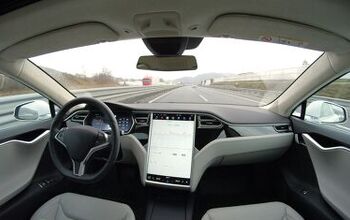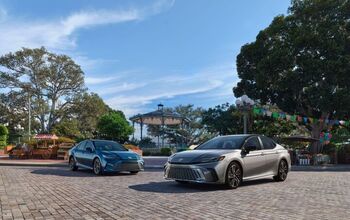Hyundai N Models to Receive Carbon Fiber Wheels

The UK-based wheel specialist from Dymag and composites wizards from Korea's Hankuk Carbon have announced the development of a line of hybrid carbon-fiber wheels for Hyundai’s N cars.
A prototype of the new N Performance carbon hybrid wheels were showcased at the Hyundai stand at this year’s Goodwood Festival of Speed alongside the spicy and all-electric Ioniq 5 N. Based on statements from Dymag, it may be the first model to receive them.
While the world can continue to debate whether Korean automakers have matched Japanese brands in terms of overall reliability, any discussions about performance are over. Hyundai and Kia have been offering some of the most entertaining vehicles in their respective segments and it’s starting to become embarrassing for the rest of the industry.
Hyundai’s high performance N models are consistently excellent and frequently go the extra mile to cater to driving enthusiasts. The brand always seems willing to push the envelope. Adding carbon fiber wheels are a continuation of that theme, as they were formerly exclusive to super cars regular people couldn’t possibly afford. Though it’s hard to say if this is the best place to spend money if you’re trying to maximize your performance dollars. While Dymag and Hyundai have been cagey on the details, these wheels will almost assuredly be optional extras and likely relatively expensive vs a set of alloys.
However, they probably won’t be as expensive as what you can option on something like the Chevrolet Corvette. This is because Dymag’s design consists of a composite outer rim and a forged metal center. While it probably won’t help to avoid any cursing when you inevitably curb them, the design should make a set cost a few thousand dollars less than wheels that were made entirely of carbon fiber.
The N Performance hybrid wheels are supposed to offer 40-50 percent weight savings against a traditional cast aluminum wheel. This is handy for reducing unsprung mass and rolling inertia. However the UK-based company said the units also improve overall stiffness and strength. Under extremely high loads the outer rim will flex, rather than deform like aluminum might. Harmonic characteristics of carbon fiber are likewise supposed to help reduce noise, vibration, and harshness.
Dyman announced its partnership with Hankuk Carbon in May, stating their intention to build lightweight composite wheels at scale. Lowering manufacturing costs was a key component of the joint program. But few were under the impression that Hyundai would be their first customer.
“The price-point for these wheels will be appropriate for both luxury and performance-oriented versions of road cars, particularly the growing high-end electric vehicle market, thanks to Dymag’s technology benefits in improving EV range and NVH,” Dymag CEO Tom de Lange stated in an earlier release. “For all automotive sectors, the dynamic, durability and aesthetic benefits of carbon composite hybrid wheels will become accessible to a larger number of consumers through OEM programmes [sic].”
The company has since said it’s in advanced development stages with multiple automakers, with further original equipment supply agreements set to be announced in the near future.
“This is the start of what we hope is a long and fruitful relationship with Hyundai, which will bring our game-changing technology to a wider audience of global automotive customers,” said de Lange. “Carbon hybrid wheels from Dymag bring many benefits for high-performance vehicles, with very low capital expenditure for car makers thanks to our patented technology and lean production methods. We look forward to announcing further OEM agreements very soon.”
Full specifications of the wheels will be made available in the coming months.
[Image: Hyundai]
Become a TTAC insider. Get the latest news, features, TTAC takes, and everything else that gets to the truth about cars first by subscribing to our newsletter.
[Images: Dymag]

A staunch consumer advocate tracking industry trends and regulation. Before joining TTAC, Matt spent a decade working for marketing and research firms based in NYC. Clients included several of the world’s largest automakers, global tire brands, and aftermarket part suppliers. Dissatisfied with the corporate world and resentful of having to wear suits everyday, he pivoted to writing about cars. Since then, that man has become an ardent supporter of the right-to-repair movement, been interviewed on the auto industry by national radio broadcasts, driven more rental cars than anyone ever should, participated in amateur rallying events, and received the requisite minimum training as sanctioned by the SCCA. Handy with a wrench, Matt grew up surrounded by Detroit auto workers and managed to get a pizza delivery job before he was legally eligible. He later found himself driving box trucks through Manhattan, guaranteeing future sympathy for actual truckers. He continues to conduct research pertaining to the automotive sector as an independent contractor and has since moved back to his native Michigan, closer to where the cars are born. A contrarian, Matt claims to prefer understeer — stating that front and all-wheel drive vehicles cater best to his driving style.
More by Matt Posky
Latest Car Reviews
Read moreLatest Product Reviews
Read moreRecent Comments
- El scotto No rag-top, no rag-top(s) = not a prestigious car brand. Think it through. All of the high-end Germans and Lexus have rag-tops. Corvette is really its own brand.World-leading engines. AMG, M, S and well Lexus is third-world tough. GM makes one of the best V-8s in the world in Bowling Green. But nooooo, noooo, we're GM only Corvettes get Corvette engines. Balderdash! I say. Put Corvette engines in the top-tier Cadillacs. I know GM could make a world-class 3.5 liter V-6 but they don't or won't. In the interior everything that gets touched, including your butt, has to feel good. No exceptions.Some think that those who pay above MSRP and brag about it are idiots. Go the opposite direction, and offer an extended 10-year 100,000-mile factory warranty. At a reasonable price. That's Acura's current business model.
- Carrera 2014 Toyota Corolla with 192,000 miles bought new. Oil changes every 5,000 miles, 1 coolant flush, and a bunch of air filters and in cabin air filters, and wipers. On my 4th set of tires.Original brake pads ( manual transmission), original spark plugs. Nothing else...it's a Toyota. Did most of oil changes either free at Toyota or myself. Also 3 batteries.2022 Acura TLX A-Spec AWD 13,000 miles now but bought new.Two oil changes...2006 Hyundai Elantra gifted from a colleague with 318,000 when I got it, and 335,000 now. It needed some TLC. A set of cheap Chinese tires ($275), AC compressor, evaporator, expansion valve package ( $290) , two TYC headlights $120, one battery ( $95), two oil changes, air filters, Denso alternator ( $185), coolant, and labor for AC job ( $200).
- Mike-NB2 This is a mostly uninformed vote, but I'll go with the Mazda 3 too.I haven't driven a new Civic, so I can't say anything about it, but two weeks ago I had a 2023 Corolla as a rental. While I can understand why so many people buy these, I was surprised at how bad the CVT is. Many rentals I've driven have a CVT and while I know it has one and can tell, they aren't usually too bad. I'd never own a car with a CVT, but I can live with one as a rental. But the Corolla's CVT was terrible. It was like it screamed "CVT!" the whole time. On the highway with cruise control on, I could feel it adjusting to track the set speed. Passing on the highway (two-lane) was risky. The engine isn't under-powered, but the CVT makes it seem that way.A minor complaint is about the steering. It's waaaay over-assisted. At low speeds, it's like a 70s LTD with one-finger effort. Maybe that's deliberate though, given the Corolla's demographic.
- Mike-NB2 2019 Ranger - 30,000 miles / 50,000 km. Nothing but oil changes. Original tires are being replaced a week from Wednesday. (Not all that mileage is on the original A/S tires. I put dedicated winter rims/tires on it every winter.)2024 - Golf R - 1700 miles / 2800 km. Not really broken in yet. Nothing but gas in the tank.
- SaulTigh I've got a 2014 F150 with 87K on the clock and have spent exactly $4,180.77 in maintenance and repairs in that time. That's pretty hard to beat.Hard to say on my 2019 Mercedes, because I prepaid for three years of service (B,A,B) and am getting the last of those at the end of the month. Did just drop $1,700 on new Michelins for it at Tire Rack. Tires for the F150 late last year were under $700, so I'd say the Benz is roughly 2 to 3 times as pricy for anything over the Ford.I have the F150 serviced at a large independent shop, the Benz at the dealership.



































Comments
Join the conversation
This isn't so much a "CF wheel" as a 2-piece wheel with a CF barrel. Still nice for mass reduction, but comparing it to a cast aluminum wheel is a bit of putting a thumb on the scale. Lemme know how it compares to a lightweight forged wheel of the same size.
2nd that! if the price difference is high enough folks will just go with the forged route instead .
(does anyone have any idea how CF does in the winter? i'm just thinking not so good so this would def just be a summer wheel IMHO)